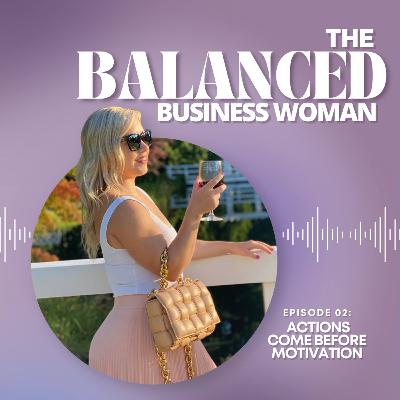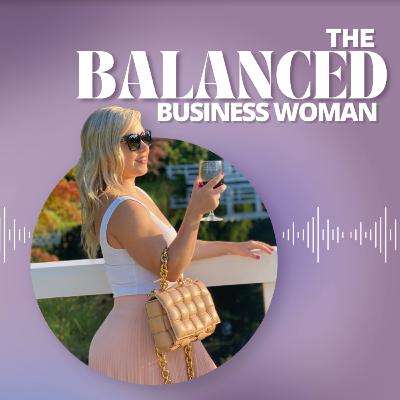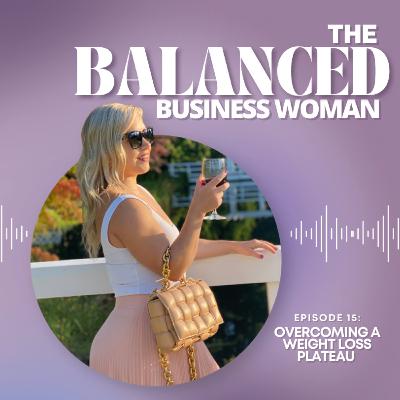Ep #2 - Actions Come Before Motivation
Description
Welcome to the balanced business woman podcast.
I am your host, Hannah Hutson, a functional fitness, balanced nutrition, and mindset coach.
And I am going to help you hit new levels in your business by building wellness and balance into your life. Listen, along as I teach you how to get rid of brain fog, balance your hormones, improve your energy levels, lower your stress and become the CEO of your health.
Because we all know if you don't take care of yourself, you won't be able to take care of your business.
Hello, everyone! And welcome again to the balanced business woman podcast. I'm your host, Hannah and we are on episode two. So excited to have you guys here today. I want to talk about motivation because when it comes to your health, I find that so many people think that they're lacking motivation or that they're lazy when it comes to their health.
But in reality, motivation is not going to be here for us, unfortunately. And so I want to challenge that thought and let you guys know that really actions need to come before motivation comes. If you're a business woman, CEO and executive, someone who works all the time, who, you know, your career is your baby, your business is your baby and you want it to do well, that's amazing. I am the same way with my business, but I also know that my health is important for me to be here a hundred percent with quality ideas, quality content in order for my business to thrive. And so your health really does determine your wealth and it might not feel like that at the moment.
You might feel like, no, I can continue to do this. I can continue to put my health on the back burner, but it's eventually going to catch up to you. And I want you to know that we got to take action first, before we find motivation, because 99% of the time, you're not going to be motivated. It's just the truth.
I get this question asked a lot. Everyone's like Hannah, you're a coach. How do you stay motivated? How do you work out all the time? How do you eat these nutrient dense meals? How do you cook for yourself? And the truth is, I work out five days a week. I cook mostly all of my meals, except for like a couple of days a week, I'll eat out or do you take out because I'm human and I don't want to cook every single night.
Um, however, this doesn't come from motivation. I'm not motivated to work out every day. In fact, most days I'm unmotivated, I'll be, you know, on the couch and I'm just like, nah, today doesn't really sound like a fun day. You know, especially in Seattle in the winter time, we don't get a lot of light. It gets dark out at like 4:00 PM and it's really unmotivating, but the truth is, it's not motivation that I'm looking for. It's that I know I'm going to feel better after I work out. And I know once I get started, it's going to be easier. And the truth is, is that I do it because I've been building these habits for years. When you perform an action over and over again in your daily life, those actions become.
And they become easy for you to do. You don't need motivation to do them at that point. You do them because they're part of your daily routine and you see the benefit in taking those actions daily. And so when we talk about daily actions, when we talk about taking action in order to maybe find motivation or just taking action, because you know you’re gonna feel better, it's important to note that those actions don't need to be huge or done perfectly. Some of the most meaningful progress is made from tiny imperfect actions taken daily. So what I want you to think about is focus on building the momentum rather than focusing on the speed at which you were moving.
Okay. So it's not super important that we, you know, find these quick fixes that are making us take these huge actions because in the end it's not going to be sustainable. And we want to take actions that are going to be sustainable. If you want to change, if you really want to change, if you're ready to take those steps to better your health so that you can be there for your business, you can be there in your career.
You can be there for your kids, whoever you need to be there for, then, you know, you have to take action. If you want to build new, healthy habits. If you want to feel energized, if you want to be clear minded, if you want to maybe change your appearance, maybe you want to lose a little weight. Um, maybe you want to stop eating as much sugar or drinking as much alcohol or, you know, being able to just think clearer for your business, then the truth is that you just have to take action. Stop looking for motivation because it's not going to be there.
But what I want to focus on today is how we take action. What actions should we be taking that is actually going to help us move the needle in the right direction. And the truth is, is that the actions you need to take are these simple, basic ones that honestly sound boring.
Those are the actions that are going to actually help you build behaviors or change your behaviors. Build those habits. And have long-term success with whatever your goals are. And one thing I want to note before we move on to some examples of this is that change is scary. I totally understand that there's many reasons for us not to change.
And that's actually something I just want you to think about what is good about not changing for you because change means stepping outside of your comfort zone. Change means doing something you might not necessarily be good at. And doing something that you're not good at, especially as we get older, that is scary. That shit is scary. And so I totally understand that change is scary and that change feels uncomfortable, but it's truly something that we have to do. And we have to push outside of our comfort zone if we want to change. And I know that is just, that is like a whole another topic and a whole another episode that I'll be talking about. But I just wanted to notate that. Before we move on to some examples of small, basic, simple actions we can take daily.
So moving into that, I'll give you a few examples. Let's just start with exercise. So exercise, you know, It depends on the person. So you might be someone who maybe you've just never moved most of your life. You were just kind of sedentary and now you're trying to find movement in your life, or maybe you took a break from it because you, you know, got caught up in your career. And so now you're trying to build some kind of exercise routines into your life. I find that it's really easy to look for the fun workouts.
Like you go on Instagram, you go on YouTube, you go to all these social media platforms and you see people doing what they call the cool workouts. You know, the exercises that look interesting, that look fun, that looked challenging and while you might want to do those. I'm going to challenge that they're actually not going to be the best for you. They're not going to give you more results. A more complex workout routine does not mean that you're going to have better results. And so instead of focusing on these complex programs and exercises, Or even just changing your workout daily, which I find some people they say they get bored with their workouts.
The truth is, is if you want results, you need to do the basics. You need to understand how to move correctly. You need to learn the movement patterns correctly. And if you go to my Instagram, get up with Hannah. You'll notice that that is one of the biggest things I focus on, um, specifically with kettlebells, but kettlebells relates to every other movement pattern with a different tool. It relates to barbell work. It relates to dumbbell work. It relates to anything in the gym. And I'm really big on form because like I mentioned, in episode one, I broke my back and I have a bulging disc. So I have to be very cautious. About how I move and I understand my body. I know when I need to tone it down, I know when I can push myself, um, and I don't push myself to the limits of getting injured, but if you're new to exercise, this might feel very new to you and you might not know when to stop or how far to push yourself.
And so it's important to really own those movement patterns. Know what a hip hinges know what a squat is, know what oppresses know what a pull is. So really owning those movement patterns and then sticking with them consistently while over the weeks working on progressive overload and progressive overload is literally a simple way of saying increase your weights over time as your body gets used to those weights and as you get stronger. So let's say you're starting with like a 25 pound squat with a dumbbell. As that becomes easier, you can increase the. Or increase the weight to challenge your body more. And these are simple actions that you can take.
Also having consistent routine. Let's say you're doing like a Monday, Wednesday, Friday, and you're doing the same workouts on Monday, Wednesday, F











